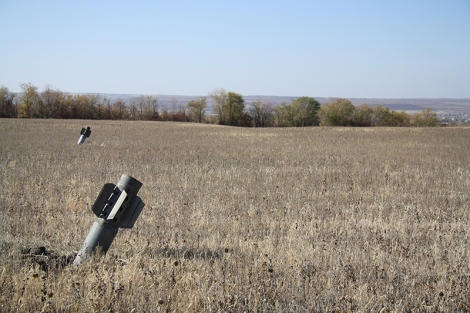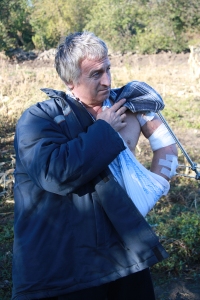Tamar Gabelnick, ICBL-CMC Policy Director
An October 2014 report by Human Rights Watch shows evidence that the Ukraine government was responsible for several documented instances of cluster munition use in Donetsk and Luhansk in recent weeks. Ukraine is not a state party to the 2008 Convention on Cluster Munitions, but has denied the use of cluster munitions and offered to participate in an investigation.
The response by Ukraine and the broader international community, detailed below, make it abundantly clear that the stigma against cluster munitions has taken firm root in the international consciousness, even among states that have not yet joined the Convention on Cluster Munitions.

The tail sections of two Smerch cluster munition rockets near Novosvitlivka, Ukraine. © 2014 Mark Hiznay/Human Rights Watch.
Alongside Human Rights Watch’s report, The New York Times published an article detailing the cluster munition use in Ukraine and noting the highly negative impact confirmed government use would have on the local population’s views of Kiev. Dozens of states, including Costa Rica as current president of the Convention on Cluster Munitions, have expressed concern or condemned the reports of recent cluster munition use, as well as reports of cluster munition use in eastern Ukraine in July.
The UN Secretary General called the reports of cluster munition use “extremely alarming” and called for a halt to their use. The cluster munition use was raised by ten UN Security Council members during a debate on the situation in Ukraine. At a recent Organization for Security and Cooperation in Europe (OSCE) Council meeting in Vienna, the United States and other OSCE member states expressed concern at the cluster munition use and called for an investigation.
Cluster munition use has become the latest subject of mud-slinging between Russia and Ukraine, with Russia issuing several statements of concern about civilian casualties from the cluster munition use in Ukraine. A Russian Foreign Ministry spokesman tweeted that the cluster munitions use showed the “barbaric nature” of Ukraine’s military actions in eastern Ukraine and called for states to push Kiev to stop using them. Ukrainian authorities in turn accused Russian forces of firing cluster munitions from Russian territory.

A victim of a cluster munition rocket attack in Starobesheve, Ukraine. © 2014 Mark Hiznay/Human Rights Watch.
The Foreign Minister of Ukraine spoke in dramatic tones about the alleged use in a letter to the Editor to The New York Times published 30 October 2014, acknowledging that these were “serious” charges against Ukraine’s Defense Forces that “deserve the deepest investigation.” The letter argued that the reports of Ukraine responsibility for cluster munition use were only an attempt by its detractors to “mar Ukraine’s name in the eyes of the world and its own citizens.” Indeed, he noted, “Ukraine is the last party that would be interested in making the local population hate the central government in Kiev.”
Ukraine’s response to the New York Times article is remarkable, as is the broader maelstrom of reactions. Ten years ago, a similar account of cluster munitions use would likely have received limited public attention. Now, any use of cluster munitions will be reported, examined, and globally condemned, as each of the small number of states that has used them in recent years has been made painfully aware. And the user will almost always cry foul, showing concern, embarrassment, or even anger that they could be associated with such stigmatized weapons.
Ukraine made many of the points that advocates for the cluster munition ban have been insisting on: any use of cluster munitions is a serious issue that deserves a full investigation; it is damaging for a state’s reputation to be associated with cluster munitions use; cluster munitions first and foremost hurt civilians; and the use of cluster munitions will lead the local population to “hate” the users of the weapons.
The next logical step would be for Ukraine, and all other states that want to be sure they will never be associated with cluster munition use, to destroy all remaining stockpiles and join the Convention on Cluster Munitions.
See Also:
- Cluster Munition Coalition (CMC) documentation of reactions to use of cluster munitions since the Convention entered into force in August 2010, and responses by the alleged users
- Human Rights Watch Storify on Ukraine cluster munition use
